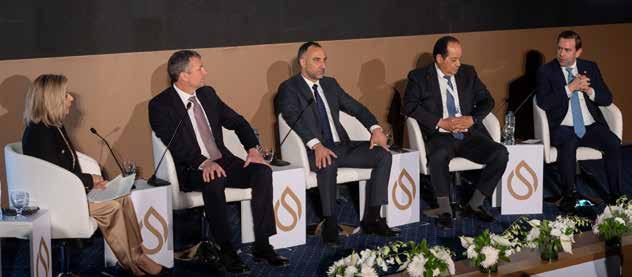
4 minute read
MAPPING A FUTURE OF GREENER GROWTH IN ENERGY MARKETS
CONTINUED FROM PAGE 1
This panel discussion brought together a stunning line-up of speakers who spoke their minds about the mechanisms required for a practical and successful transition, meeting the net-zero ambitions. More importantly, the session also highlighted the speakers’ expertise in changing their business models and making tough choices to strike a balance between adopting new generation energy solutions and ensuring stability and security amidst global disruptions.
Advertisement
African Gas
The activities of the strategic conference further featured a fireside chat on African gas. The chat was a candid conversation tackling the opportunity of gas for the African continent. The fireside chat was a platform for Milton Catelin, Secretary General of the International Gas Union (IGU); Rashid Abdallah, Executive Director of the African Energy Commission (AFREC); and Mickael Vogel, Director & Head of Research at Hawilti, to share their views on the energy future of the continent.
The session talked about Africa’s access to energy. Vogel noted that “even if [one] was to bring electricity for the 600 million people who live in the dark, even if every African household has access to clean cooking, [Africa] will still be energy poor.”
Additionally, the session moved to discuss solutions for energy inaccessibility in Africa, despite its large reserves. Catelin explained the most important action that needs to be considered by African leaders is developing the existing fields and ensuring “adequate returns for the country itself, and ensuring that they are not just exporting the gas.” Meanwhile, Abdallah highlighted several points including the fact that “Africa’s energy transition is to move from no energy to energy.” Additionally, he pointed out that Africa needs to work on infrastructure, access. “We need to put in place the right policy for investment,” Abdallah said, adding “we need to boost our trade between African countries,” so that, countries with surplus gas can provide those with low access to natural gas across Africa.”
The Rise of Gas, LNG
The Strategic Conference included another global business leaders’ session on the rise of gas and LNG, discussing the global scramble in a tight market with soaring prices.

The leaders in the LNG discussion included John Ardill, Global Exploration Vice President at ExxonMobil; Yossi Abu, CEO of NewMed Energy; Magdy Galal, Chairman of Egyptian Natural Gas Holding Company (EGAS); and Cederic Cremers, Executive Vice President LNG at Shell.
The attendees shared their insights on the current global trading environment. Cremers stated that the recent challenges in the energy market “showed us all in the world that we cannot take reliable secure energy for granted.”
Accordingly, the choice of investments has been affected by the energy supply and demand. Ardill noted that “We are certainly investing in the upstream business at a sustainable growth rate, and we are also investing very heavily in the low-carbon
The session further highlighted the region’s agreements and partnerships to provide supply and be a hub for energy, as Egypt opens its additional capacity in the liquefaction plants for other countries in the region to export their production to Europe. Abu talked about boosting the infrastructure between the region’s countries to boost exports, mentioning the LNG pipeline, which connects Israel and Egypt, stating that the Egyptian government and the Israeli government are adding an “onshore connection that will allow in total years the additional flow of 6 to 8 bcm.”
Meanwhile, Galal assured attendees that the region is working hand in hand to secure supply. “Stability of supply will become a very important key factor in [the] years to come, and I think that this region can provide a stable supply of natural gas and LNG to the world. This is what we are keen to do.”
Flexibility Remains Fundamental to Meet Emerging Challenges
As the entire industry is on a journey of change, energy security remains part and parcel of this journey with the aim to ensure the required stability in this domain. In the meantime, COP27, with its unified voice for energy transition and decarburization, has added impetus to the drive towards a low-carbon future and the momentum towards renewable energy.
Driven by the need for change, Anja Isabel Dotzenrath, Executive Vice President of Gas and Low Carbon Energy at bp, stressed that it is not ‘or’ discussion as all aspects should be put into consideration to ensure sustainable transition. “Transition needs to be orderly. There should be also investments in bioenergy, biofuels, biogas, and low-carbon hydrogen,” she opined.
For his part, Alessandro Bernini, CEO and Chief Operating Officer at Maire Tecnimont Group, noted in such a variable environment, the key word is ‘flexibility’ as the transition imposes several challenges. “There should be in-depth knowledge of the environmental policies of the various countries as well,” he added.
Bernini also touched upon the importance of investing in technology through collaboration with partners and service providers to open the door for more alternatives for decarbonisation.” What we are doing internally is that we are investing a lot in technologies. In addition, in our company, we are open to any geography. We will continue investing in Africa to implement projects that are already in compliance with our targets.”
In his intervention, Luca Vignati, Upstream Director at eni, explained though the transition is not easy going, the stakeholders should not give up. “This is what we are doing for the community.” He also highlighted the role played by data and science in outlining the value of transition, which is an essential brick.
Paul Marsden, President of Energy Bechtel, shared the same opinion that without adequate knowledge, no technologies can unlock potential of transition.
From Marsden’s point of view, investment in new infrastructure is crucial for new energies. “We are developing this new infrastructure. It’s got to be successful.”
Alessandro Puliti, CEO of Saipem, clearly outlined the required guidelines for energy transition, namely sharing risk, joining forces along with less competition. “We have to be more
CONTINUED IN PAGE 4







